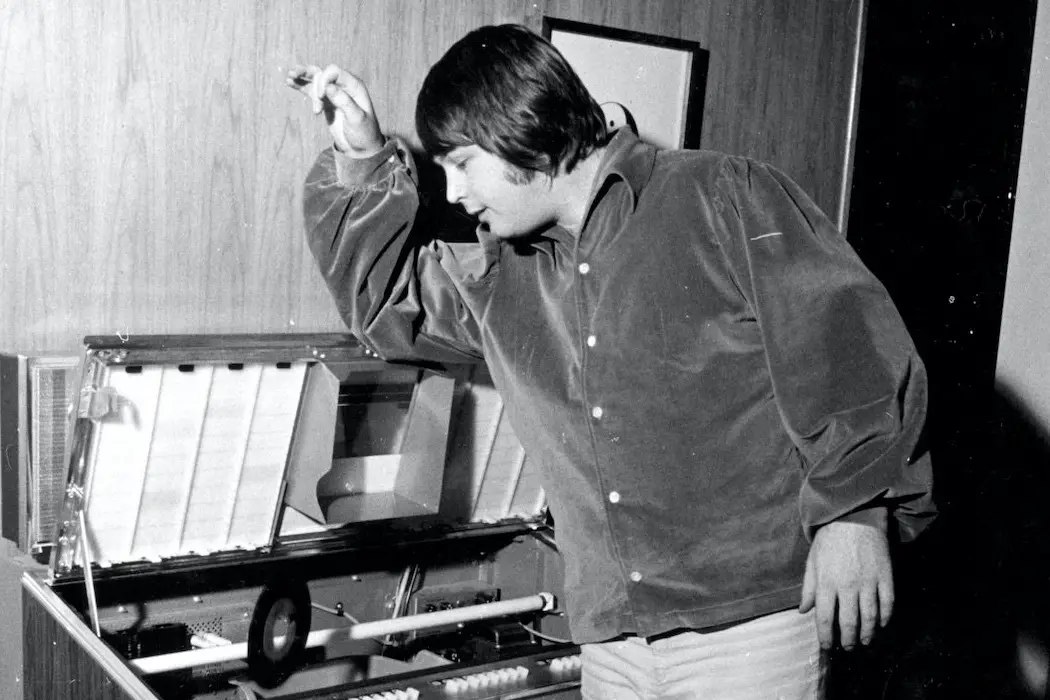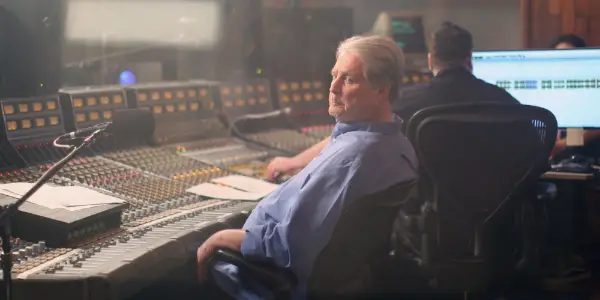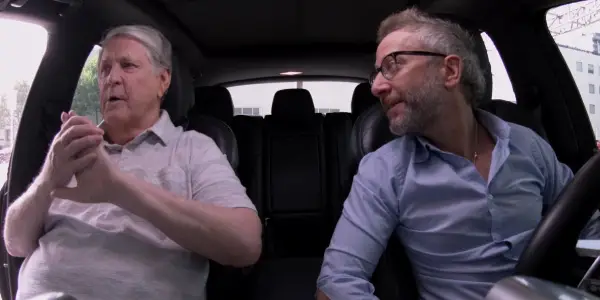BRIAN WILSON: LONG PROMISED ROAD: Showcases The Musician’s Humanity And Brotherly Love

Tynan loves nagging all his friends to watch classic movies…
Films like Love and Mercy and The Wrecking Crew made extensive efforts to examine the musical genius of Brian Wilson. He was a young man who had an unprecedented surge of creativity, using the studio as an instrument to cater to the orchestra playing in his head. One of his finest achievements, “Good Vibrations,” was an unheard-of departure for a pop song, and it used no fewer than four different studios to evoke his personal vision.
Producer Don Was sits at the soundboard and cuts all the instrumentation and just plays the harmonies to the song, shaking his head with a smirk; it’s crazy, almost otherworldly, just listening to this one element in isolation.
Wilson threw away the rulebook by creating unique melodies and dreaming up textures that never existed before. His music is complex but lyrically so simple and relatable to everyone. Although Brian never learned how to surf – this was his brother Dennis’s forte — The Beach Boys effectively created a world for listeners to enter into. It’s given them a lasting place in California culture and beyond.
The friendly competition between Brian Wilson and The Beatles (Lennon-McCartney) has long been a part of pop music lore. Early on in Long Promised Road Elton John even comments The Beatles had George Martin, but Brian Wilson did it himself. Regardless, of your thoughts on this, his rise was pretty phenomenal. He helped pen seven top 10 singles by the time he was 22-years-old! Even as all of this is true, it runs the risk of simply acknowledging Wilson as a mere savant who we can never hope to understand.
Brian Wilson: Human Being
Thankfully, with its more intimate scope, flawed or not, the documentary attempts to understand the human being so that we might empathize with him. A great deal of the runtime is filled up with footage as Brian Wilson talks with his friend Jason Frye while driving around the Beach Boys‘ old haunts.

Jason also happens to be an editor for Rolling Stone magazine, but he has an even-keel delivery that makes Brian more at ease. With his history of anxiety on stage, Wilson’s never going to be overly loquacious – he hardly seems to let slide more than a few sentences at a time — but it’s always sincere.
His observations are matter-of-fact, whether it’s recollecting his roots in Hawthorne or his residences during the height of his fame. In those days he was young and married with money and a cavalcade of hits. Acid trips freaked him out but it was mostly an exciting, totally groovy moment in history.
During those years he had a few notable house guests like The Mama and Papas, Little Richard, Sly and The Family Stone, and Elton John. He also found time to pen a few minor hits like “Calfornia Girls and “Help Me, Rhonda.” At Laurel Way, he famously put his piano in a giant sandbox and subsequently dreamed up “Good Vibrations.”
One of the documentary’s mini revelations is an older Brian Wilson in the recording studio again, now well after the years of Pet Sounds. He’s not a tyrant — saying “Hi” to folks and asking them how they are – but he knows what he wants. Once he gets it, he’s ready to let the music carry them away. This hasn’t changed with age.
Brian and His Brothers
The most reassuring element of Long Promised Road is how it effectively took my immediate concern and turned it completely on its head. Because it’s easy to spin a narrative about the troubled genius of Brian Wilson who single-handedly propelled his band into the stratosphere of music royalty. However, this unfairly lessens the impact of his fellow members: Mike Love, Al Jardine, and of course his brothers Carl and Dennis.

Even the documentary gets its title, Long Promise Road, from a song that Brian didn’t write. It was Carl’s song with lyrics by Jack Rieley. In one brief moment, Brian acknowledges that his only input was one small passage of vocals. After all, he’s not a credit hog.
Later, we find out he’s never listened to Dennis’s solo album. However, we get a sense it was never out of scorn or disinterest. He genuinely loved the guy, reminiscing about how Dennis always used to drink grapefruit juice and vodka. And of course, there was a time when they snorted cocaine together… It was indicative of the lifestyle. And yet Brian is quick to praise an underrated track like “Forever” totally blessed by Dennis’s vocals.
The moment they actually sit down in his living room and turn on “River Song” is an awesome experience, just basking in Brian’s genuine reaction. I only recently discovered the track myself, and I share Brian’s immediate appreciation even if I could never know his brother as closely as he did. I can only imagine what goes through his head while listening to it.
Brian Wilson: Long Promised Road: Conclusion
If there is one unifying takeaway from Long Promised Road it’s that Brian Wilson is such a kindhearted soul. It would be so easy to take advantage of his good graces, and you could see how there’s such a narrow dividing line between Eugene Landy‘s insidious manipulation of Wilson and a documentary trying to capitalize on his fame. I’d like to believe in the good intentions present here.
Once the talking heads dissipate and it’s Brian in the car reminiscing, it’s pretty amazing. After remembering Dennis he’s quick to praise Carl too. Brian was meant to sing lead on “God Only Knows,” only to relinquish the part to his little brother. The rest has been canonized for posterity thanks to one of the finest romantic ballads ever.
In another moment Brian mourns the death of Jack Rieley – their former manager who had actually been dead quite a few years — but he was a man who meant a lot to Brian, and the news affects him deeply. He requests the song “It’s OK” as a kind of recalibration of happiness and a tacit reminder that things will indeed be okay.
He readily acknowledges, when you first start, drugs take you up to heaven and then plummet you back down to hell where they led him. This language feels hyperbolic only if it’s taken out of the context of his creativity. We are reminded that there’s almost a spiritual aspect to Brian’s music running counterpoint to his struggles and addictions. He manages to tap into the same source of gospel music, that deep sadness that we carry inside ourselves, binding us up, and carrying us forward into a better space.
Don Was says he heard that Brian supposedly once prayed to make better music than The Beatles’ Rubber Soul. He gets a major kick out of it, and it makes sense why. Still, I can just imagine Brian Wilson sending up the most sincere supplication asking for the Creator’s favor in his artistic endeavors. Whatever your beliefs, most would be quick to conclude his prayer was answered: After all, we got Pet Sounds. What a gift it was.
Were you already aware of Brian Wilson and The Beach Boy’s music? Let us know in the comments below.
Does content like this matter to you?
Become a Member and support film journalism. Unlock access to all of Film Inquiry`s great articles. Join a community of like-minded readers who are passionate about cinema - get access to our private members Network, give back to independent filmmakers, and more.
Tynan loves nagging all his friends to watch classic movies with him. Follow his frequent musings at Film Inquiry and on his blog 4 Star Films. Soli Deo Gloria.












